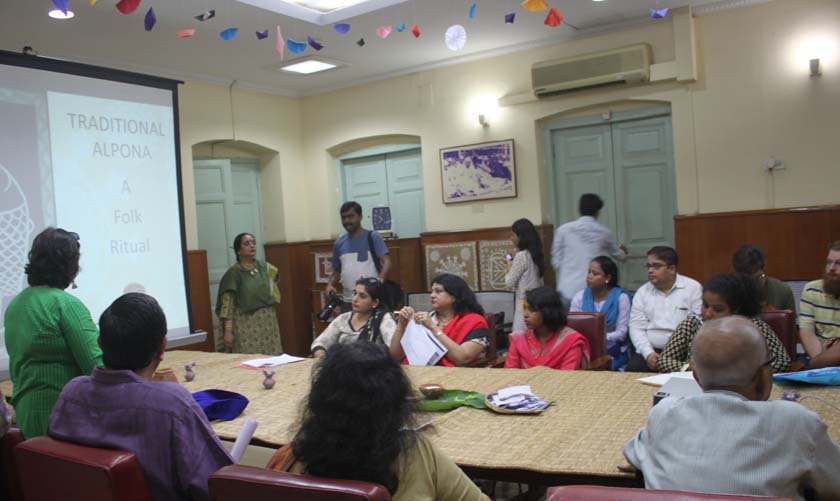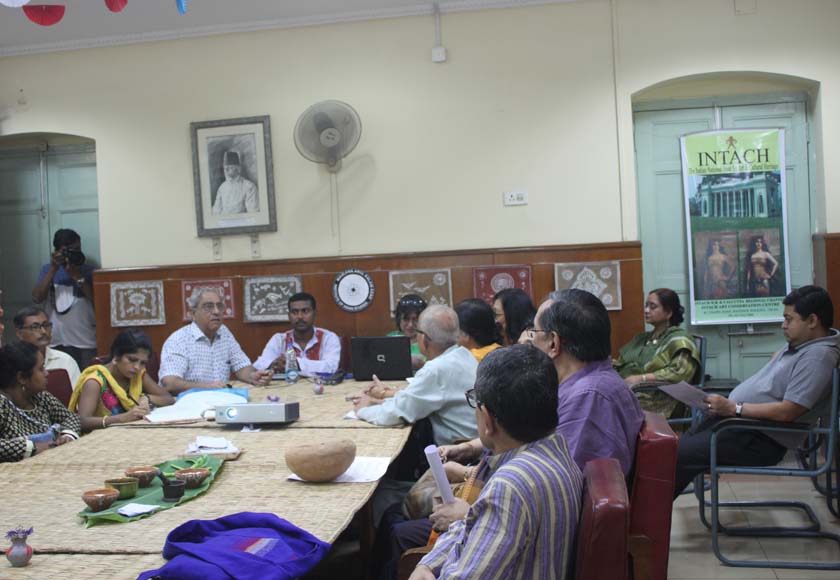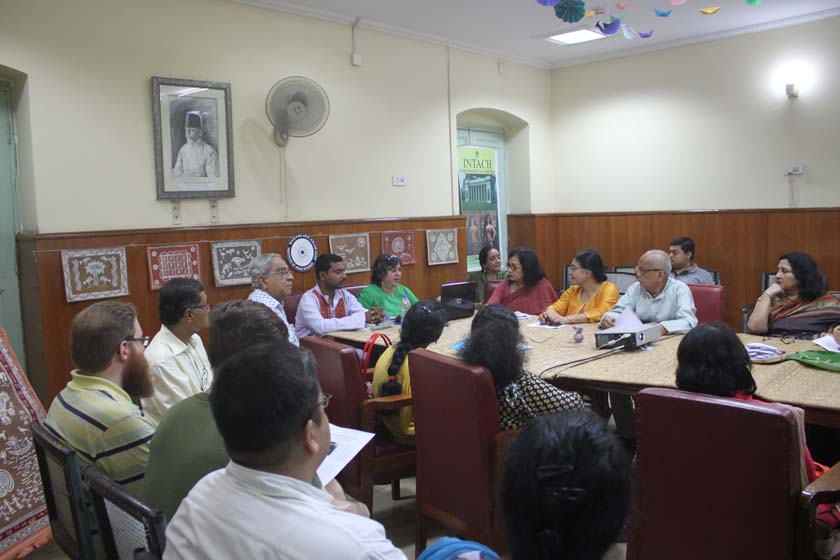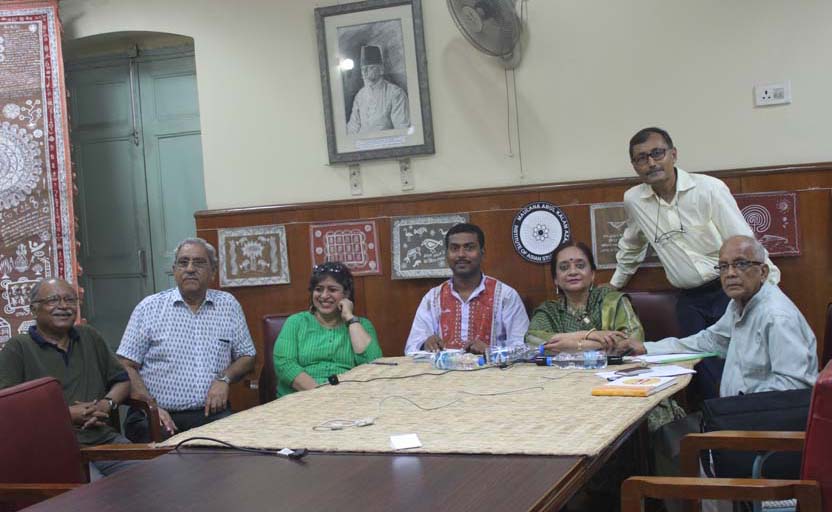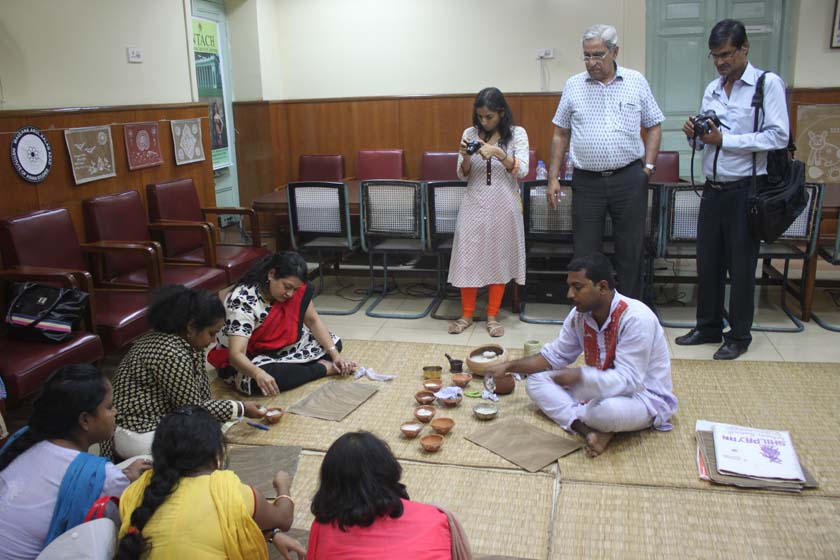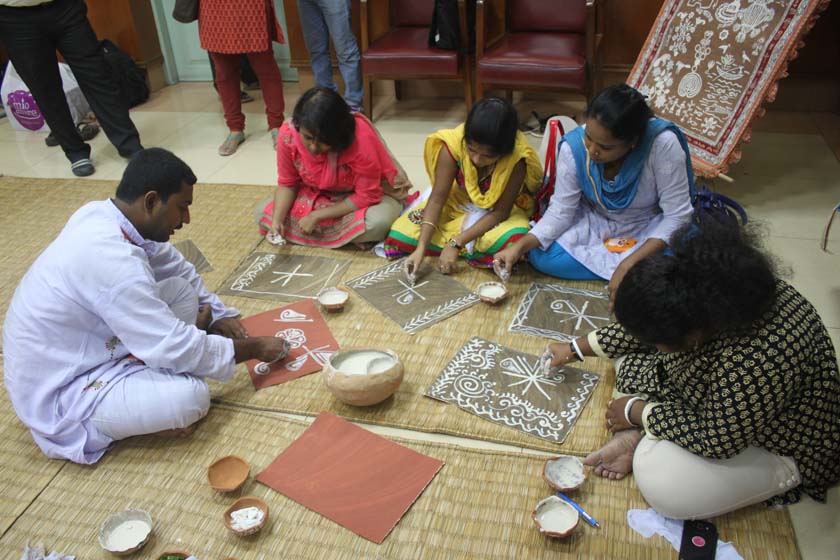INTACH WB and Calcutta Regional Chapters – Conservation of ICH – Alpona traditions of Bengal Back
A day-long programme consisting of a lec-dem followed by a workshop on Alpona traditions of Bengal organised by INTACH WB and Calcutta Regional Chapters was held on the 30th July, 2016 at the Maulana Azad Museum in Kolkata. It was a very well-attended programme. The participants included members of INTACH, American students from the American Institute of Indian Studies, teachers from the Sri Sri Academy, as well as teachers from the Maya Foundation and the Sarva Siksha Abhiyan, and organisation for imparting education to the underprivileged. Daricha Foundation, a organisation set-up for the documentation and preservation of the intangible cultural heritage of Bengal had arranged to bring one of the well-known Alpona artists, Rabi Biswas to give the presentation and conduct the workshop. The audience was enthralled by the cultural significance of he various Alpona designs as well as the Brotos and Charras which accompanied the painting of the designs. The participants in the workshop got an opportunity to try their skill on this art form.
Lec-Dem & Workshop On Traditional Alpona
A proposal by INTACH
Conducted by Alpona artist Rabi Biswas & facilitated by Daricha Foundation
- Introduction
At any social or religious ceremony in West Bengal today, it is quite common to see white floral motifs embellishing the floor. This is the alpona and its role today is primarily ornamental with a touch of auspiciousness. However the roots of alpona lies in a folk tradition that has been practised by the women of rural West Bengal for centuries. It is not to be confused with the alpona made famous in Shantiniketan.
The lec-dem cum workshop is proposed by INTACH facilitated by Daricha Foundation with the aim to introduce the art of traditional alpona, a dying folk ritual, to participants. Handed down from mother to daughter through generations, the folk alpona was in essence, a ritualistic expression of the rural Bengali woman’s hopes and aspirations – seeking peace and well being for her family and kinsmen. Both married women and unmarried girls would undertake vows or “vrata” or “broto” (in Bengali) to invoke the blessings of a deity, with a view to having her wishes fulfilled. Each such broto had a specific alpona associated with it. Skillfully using their fingers as a brush, artistic motifs would be made using rice powder paste, and be embellished with the artist’s innate creativity.
The ritual would be completed with the chanting of specific “magic” verses (chharas) and narration of stories (Broto Katha) eulogizing the deity. It was believed that the force generated from this “magic” would yield the desired results. The entire ritual was completely in the woman’s domain. There was a remarkable variety of alpona themes and the symbols or the patterns drawn would be understood by people who knew its purpose. But this charming tradition is on the wane, with the advent of modernization. Only a fraction of the brotos and with it, the corresponding alponas, practised in an earlier time remain today – less than 20.
The artist, Rabi Biswas has created a space for himself in a woman’s domain and has taken upon himself the charge of keeping these alponas alive. A keen artist, Rabi, was fascinated by the art from a very young age. He began to learn from his grandmother and all the other grandmothers in the village, and gradually found himself becoming the main alpona artist of his home and village. Younger women were too happy to be freed from this responsibility and be able to switch on their cable TV instead. He has also researched alponas across districts, learning and documenting, before this art succumbs to the idiot box.
The lec-dem cum workshop is designed to create awareness about brotos and alponas in general and will teach participants the art of drawing specific alponas and familiarize them with the stories and rhymes associated with them. Given that the programme is to take place in end July – during the monsoons, it may not be possible to demonstrate on open ground. Thus, participants will be taught to specially prepare paper as base for the alponas. This will comprise treating it clay and dung. Once this is dry, it is ready for the alpona. However, for the purpose of the workshop, the artist will provide pre-treated paper to each participant and demonstrate the coating process. Each participant will be able to take home the alponas she or he has made.
- Objectives
- The lec-dem has been designed to introduce the audience to brotos and alponas in
general – the history, why these rituals were conducted, when and so on.
- It will additionally familiarize participants with some of the brotos that are/were
associated with alponas. The Broto katha will be recited and the “magic” rhymes
“chhoras” chanted for six to eight alponas. This will include well known brotos like those
associated with the winter harvest and Lakshmi Puja as well as lesser known brotos that
are still practised in some villages.
- Alponas vary sometimes between region or community. This too will be demonstrated.
- It is hoped that by the end of the lec-dem, participants may learn to identify several
motifs and what they symbolize.
- For the workshop component, participants will receive hands-on training in the basic
technique employed in a ritual alpona. Participants will be guided through the
intricacies of one or two alponas, the motifs used, technique applied etc .
- The language of communication will be mainly Bengali
III. Programme details
This will be a 1 day lec-dem cum workshop of 6 hours aimed at participants from 14 years
upwards. The timings will be from 10.30 – 1pm for the lec-dem and from 2pm to 5pm for those
who wish to get down on their hands and knees and train under Rabi.
Activity outline :
LEC-DEM
10.30 – 12 noon Introductory session on brotos & alponas illustrated with
pictures on walls + powerpoint; recitation of chhoras and broto
kathas
12 noon -1pm Demo of base preparation + rice powder preparation &
application
LUNCH 1-2pm
WORKSHOP
2 – 5 pm Drawing technique demo of the various motifs that go into a
ritual Alpona discussed earlier + Demonstration of
Region/Community wise variation of this alpona
Material required
The artist will bring all the material required for the demo – treated paper, rice powder,
‘khari mati’ etc
Presenters:
- Rabi Biswas, traditional alpona artist and researcher
- One representative of Daricha Foundation
- Workshop date and Venue:
July 30, 2016
Maulana Azad Museum, Ashraf Mistri Lane, Opp Ballygunge Military Camp, Ballygunge Circular Road, Kolkata



